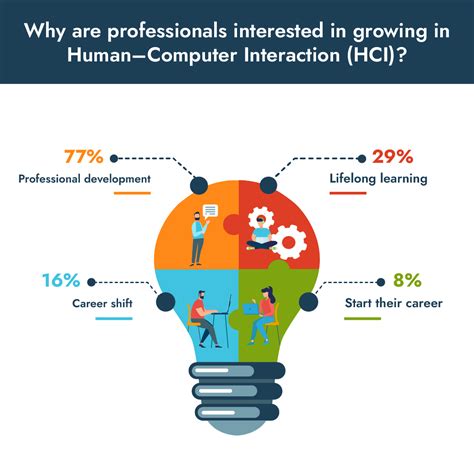Careers In Hci

The field of Human-Computer Interaction (HCI) is an exciting and rapidly growing area that offers a wide range of career opportunities. HCI professionals play a crucial role in designing, developing, and optimizing user experiences across various digital platforms and devices. As technology continues to advance and shape our daily lives, the demand for skilled HCI experts is on the rise. In this comprehensive guide, we will explore the diverse career paths within HCI, delve into the skills and knowledge required, and uncover the impact these professionals have on shaping the digital world.
Understanding Human-Computer Interaction

Human-Computer Interaction is an interdisciplinary field that focuses on the relationship between users and technology. It involves understanding human behavior, cognitive processes, and interactions with digital interfaces to create intuitive, user-friendly systems. HCI professionals aim to bridge the gap between technology and humans, ensuring that digital products and services are not only functional but also accessible, efficient, and enjoyable to use.
Career Paths in HCI

The HCI domain offers a plethora of career opportunities, each with its own unique focus and skill set. Here are some of the key roles and specializations within the field:
User Experience (UX) Designer
UX designers are at the forefront of HCI, responsible for crafting seamless and engaging user experiences. They conduct user research, create wireframes and prototypes, and iterate on designs based on user feedback. A UX designer’s goal is to ensure that digital products meet user needs and provide a positive, intuitive experience.
Key Skills: User research methodologies, prototyping tools, design thinking, information architecture, and visual design principles.
User Interface (UI) Designer
UI designers focus on the visual aspects of digital interfaces, ensuring that they are aesthetically pleasing, easy to navigate, and aligned with brand guidelines. They work closely with UX designers to bring user flows to life, creating interactive and visually appealing designs.
Key Skills: Graphic design, UI design tools (e.g., Adobe XD, Sketch), interaction design principles, typography, and color theory.
Interaction Designer
Interaction designers specialize in designing the behavior and interactions of digital products. They define how users interact with interfaces, creating intuitive interactions and animations. Interaction designers often collaborate with UX and UI designers to ensure a cohesive user experience.
Key Skills: Interaction design principles, animation techniques, prototyping tools, user testing methodologies, and an understanding of human behavior.
Usability Analyst/Evaluator
Usability analysts assess the usability and effectiveness of digital products. They conduct user testing, gather feedback, and analyze data to identify areas for improvement. Usability evaluators play a critical role in ensuring that products meet user expectations and are easy to use.
Key Skills: User testing methodologies, data analysis techniques, report writing, and an understanding of user psychology.
HCI Researcher
HCI researchers contribute to the advancement of the field through academic research and innovation. They explore new interaction techniques, conduct studies, and publish their findings to influence the design of future technologies. HCI researchers often collaborate with industry professionals to bridge the gap between theory and practice.
Key Skills: Research methodologies, data analysis, writing academic papers, and a strong foundation in HCI theory.
HCI Consultant
HCI consultants provide expert advice and guidance to organizations, helping them improve their digital products and services. They work on a project basis, offering strategic insights and recommendations to enhance user experiences. Consultants often specialize in specific industries or domains.
Key Skills: Industry knowledge, project management, communication skills, and a broad understanding of HCI principles.
Product Manager (with an HCI Focus)
Product managers with an HCI focus play a crucial role in defining and driving the vision of digital products. They collaborate with cross-functional teams, including designers and developers, to ensure that products meet user needs and business goals. Product managers often have a deep understanding of user behavior and market trends.
Key Skills: Market research, product strategy, project management, communication skills, and an ability to balance user needs with business objectives.
Education and Skills Required
A strong foundation in HCI typically requires a bachelor’s or master’s degree in a relevant field, such as Human-Computer Interaction, Interaction Design, Computer Science, or Cognitive Science. Additionally, professionals in this field often have a combination of technical and soft skills. Here are some essential skills for a successful career in HCI:
- User-Centric Thinking: A deep understanding of user needs, behaviors, and motivations is crucial for creating effective designs.
- Design Thinking: The ability to approach problems creatively and iteratively, using design thinking methodologies to solve complex challenges.
- Research Skills: Proficiency in conducting user research, including interviews, surveys, and usability testing, to gather valuable insights.
- Analytical Skills: The capacity to analyze data, interpret findings, and make data-driven design decisions.
- Technical Proficiency: Familiarity with design tools, programming languages, and prototyping platforms is essential for bringing designs to life.
- Communication and Collaboration: Effective communication and the ability to collaborate with diverse teams, including designers, developers, and stakeholders, are key.
- Adaptability: The HCI field is dynamic, so professionals must be adaptable and open to learning new skills and technologies.
The Impact of HCI Professionals
HCI professionals have a profound impact on various industries and aspects of our lives. Their work improves user experiences, enhances accessibility, and drives innovation. Here are some key ways in which HCI experts contribute:
Enhancing User Experiences
HCI professionals ensure that digital products are intuitive, easy to use, and meet user expectations. By conducting user research and iterative design processes, they create interfaces that resonate with users, leading to increased engagement and satisfaction.
Improving Accessibility
Accessibility is a critical aspect of HCI. Professionals in this field work to ensure that digital products are inclusive and accessible to all users, regardless of their abilities or disabilities. They employ universal design principles and conduct accessibility testing to make technology more inclusive.
Driving Innovation
HCI researchers and innovators push the boundaries of technology, exploring new interaction techniques and designing for emerging technologies. Their work paves the way for innovative products and services, shaping the future of human-computer interaction.
Shaping Industry Standards
HCI professionals contribute to industry standards and guidelines, ensuring that digital products are developed with a user-centric approach. Their expertise influences design best practices and sets the bar for user experience excellence.
Future Prospects and Trends

The field of HCI is constantly evolving, driven by technological advancements and changing user needs. As we move forward, several trends and developments are shaping the future of HCI careers:
Artificial Intelligence and Machine Learning
AI and ML are revolutionizing HCI, enabling more intelligent and adaptive interfaces. HCI professionals will play a crucial role in designing interactions with AI-powered systems, ensuring ethical and user-friendly experiences.
Voice and Gesture Interfaces
With the rise of voice assistants and gesture-based interactions, HCI experts are exploring new ways to design natural and intuitive interfaces. They are pushing the boundaries of traditional input methods to create more immersive user experiences.
Internet of Things (IoT)
The IoT ecosystem presents unique challenges and opportunities for HCI professionals. Designing intuitive interactions for a wide range of connected devices requires a deep understanding of user behavior and context.
Ethical Considerations
As technology becomes more integrated into our lives, ethical considerations are becoming increasingly important. HCI professionals must navigate issues such as privacy, data security, and the responsible use of technology to ensure that user experiences are not only effective but also ethical.
Conclusion
Careers in HCI offer a diverse and rewarding path for those passionate about technology and human-centric design. From UX designers to HCI researchers, professionals in this field have the power to shape the digital experiences of the future. With a strong foundation in user-centric thinking, design skills, and a willingness to adapt, individuals can forge successful and impactful careers in HCI.
What is the average salary for HCI professionals?
+Salaries in the HCI field can vary widely depending on factors such as experience, location, and industry. On average, UX designers can expect to earn around 70,000 to 120,000 annually, while HCI researchers may earn between 60,000 and 100,000. However, these figures are just estimates, and actual salaries can differ based on various factors.
What are the key skills to focus on for a career in HCI?
+Key skills for an HCI career include user research, design thinking, prototyping, user testing, and data analysis. Proficiency in design tools and an understanding of user psychology are also essential. Additionally, soft skills like communication and collaboration are crucial for working effectively with cross-functional teams.
How can I gain practical experience in HCI?
+Practical experience is invaluable in the HCI field. You can gain hands-on experience through internships, freelance projects, or personal design challenges. Additionally, participating in design competitions, attending workshops, and contributing to open-source projects can help build your skills and portfolio.
What industries offer the most opportunities for HCI professionals?
+HCI professionals are in high demand across various industries, including technology, healthcare, finance, and e-commerce. Additionally, emerging fields like virtual reality, augmented reality, and voice technology offer exciting opportunities for HCI experts.



